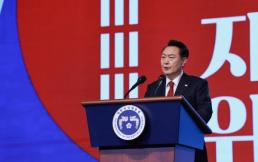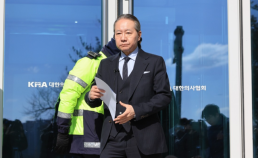U.S. President Barack Obama pressed executives from the country's biggest banks Monday to stop lobbying against his proposed financial regulatory overhaul and help get the U.S. economy back on its feet by boosting lending.
US Bancorp CEO Richard Davis told the group meeting at the White House that his bank would be willing to take a second look at every loan it rejects. And he said he would present the idea to other members of the Financial Services Roundtable — a group representing the largest financial companies, according to the Roundtable. Davis is its incoming chairman.
Obama, in a statement after more than an hourlong meeting with the executives, said he reminded them that much of the financial crisis that took the U.S. banking system to the brink of collapse had been "of their own making." He also exhorted the executives — both in private and in public — to drop their opposition to an overhaul of the nation's financial industry.
"If they wish to fight commonsense consumer protections, that's a fight I'm more than willing to have," Obama told reporters in the Diplomatic Reception Room of the executive mansion.
He also urged lenders to find creative ways to free up lending. Obama said banks have benefited from bailouts and should use that strength to lend more money to consumer and businesses.
"But given the difficulty business people are having as lending has declined and given the exceptional assistance banks received to get them through a difficult time," he said, "we expect them to explore every responsible way to help get our economy moving again."
Delay, he said, was not an option he was willing to consider as his administration has focused on digging out an economy that has left more than 15 million Americans out-of-work. An economy with double-digit unemployment next year threatens political fortunes for Obama's fellow Democrats in the 2010 midterm elections — and presumably even Obama himself in a 2012 re-election bid.
The president has sought to bolster Americans' confidence, talking often about accomplishments from the $787 billion economic stimulus package he sought early in his office and a potential follow-up jobs program to jump-start the economy.
"And so I urged these institutions here today to go back and take a third and fourth look about how they are operating when it comes to small business and medium-sized business lending," he said.
Bank of America CEO Kenneth Lewis pledged to Obama that his bank would lend $5 billion more to small- and mid-sized businesses in 2010 than it did in 2009, the bank said. It said the move is part of the bank's broader effort to support an economic recovery.
JPMorgan said last month that it would boost such lending by $4 billion.
Obama's stern lecture came hours after Citigroup Inc. said that it was repaying $20 billion in bailout money it received from the Treasury Department, in an effort to reduce government influence over the banking giant. The government will also sell its stake in the company.
Meanwhile, regulators are telling banks to be more skeptical about potential borrowers. They are forcing banks to keep larger cushions of capital to protect against future losses. That means there's less money available to lend.
The meeting came amid Obama's fierce criticism of Wall Street. In an interview that aired on Sunday, Obama rebuked executive paychecks at firms that only last year required tax dollars to keep their doors open.
"I did not run for office to be helping out a bunch of fat cat bankers on Wall Street," Obama told CBS's "60 Minutes."
Bankers brushed off Obama's harsh rhetoric.
After House passage of a regulatory overhaul Friday, the work now shifts to the Senate, which has been preoccupied with health care legislation.
Obama said rhetoric and reality on financial overhaul don't align.
"The problem is, there's a big gap between what I'm hearing here in the White House and the activities of lobbyists on behalf of these institutions or associations of which they're a member up on Capitol Hill," Obama said.
"I urged them to close that gap, and they assured me that they would make every effort to do so."
Banks, industry groups and the U.S. Chamber of Commerce have uniformly rejected the administration's proposal to create a new Consumer Financial Protection Agency. Some have proposed alternatives that consumer groups believe would defang the proposed agency.
아주경제= 인터넷뉴스팀 news@ajnews.co.kr
(아주경제=ajnews.co.kr) 무단전재 배포금지
©'5개국어 글로벌 경제신문' 아주경제. 무단전재·재배포 금지


![[르포] 중력 6배에 짓눌려 기절 직전…전투기 조종사 비행환경 적응훈련(영상)](https://image.ajunews.com/content/image/2024/02/29/20240229181518601151_258_161.jpg)



